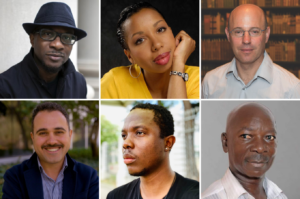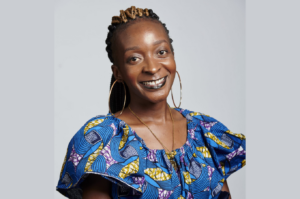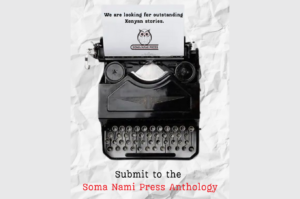
The following text was drafted during a collective effort some years ago to secure a public honor for Láńrewájú Adépọ̀jù, the leading Yoruba poet and man of letters. The authors of the text consider it apposite as a tribute to the extraordinary poet, and present it here as additional information that should benefit the general public.
***
The poet Láńrewájú Adépọ̀jù who died on December 9, 2023 at the age of 83 was, in our estimation, an artist of extraordinary talent. He made exceptional contribution to the development of Yoruba poetry and was noted for his exemplary defense of human rights through his art. Adépọ̀jù defied the constraints that his poor background posed to his education to acquire literacy outside the formal school environment. After trying his hands at many vocations in Ibadan, he developed his endowment as a poet, first as a staff of the Old Western Nigeria Broadcasting Service and later as an independent practitioner.
Adépọ̀jù earned an enviable stature as a foremost Yoruba poet, having been associated with more developments that have transformed the value, content, and craft of the art as much as any other poet. A published author of dramatic works, with titles such as Ladepo Ọmọ Adanwo, S’Agba Di Were, as well as the poetry volume, Ironu Akewi, he also published a collection of lectures titled A Glimpse of Reality. He enriched ewì by extending its functions and its formal features. Specifically, Adépọ̀jù came to be associated with a form of ewì that is philosophical in insight, topical in outlook, critical in tone, and grounded in history. The intellectual import of his work is evident in the rigour of his arguments and the confidence and boldness with which he interpreted experiences and events in the wider Nigerian national context.
Adépọ̀jù was a poet whose work has benefitted most from familiarity and interaction with other notable figures in the tradition, such as Adebayọ Faleti, Ọlatubọsun Ọladapọ, and Yẹmi Ẹlẹbuibọn. Perhaps more important is the fact that he demonstrated exceptional courage in acting as the mouthpiece of ordinary Nigerians, especially when issues of social justice, equity and fairness were at stake, while still maintaining his allegiance to the Nigerian state. His principles and practice of ewì thus combined to make him an outstanding figure not just in the Yoruba environment but also in the wider context of contemporary African oral poetry. It is no surprise that his work has been the focus of no fewer than ten doctoral theses in universities in Nigeria and Britain in the past three decades.
However, for all his devotion to the art of poetry and advocacy for social justice, Adépọ̀jù did not live in opulence. He derived his sense of fulfillment from devoting his art and talent to the causes he believed in. It is no surprise that his survival in his final years was a function of the immense goodwill and popularity he enjoyed among those who valued his work.
A paradox of unequal exchange characterizes the relationship between the Nigerian intellectual community and major cultural producers, especially creative and performing artists. This manifests as eagerness on the part of the creative classes, if not in fact the Nigerian society at large, to recognize and explore the output of the foremost creative artists without giving them due recognition. This has been the fate of many outstanding Nigerian creative artists, oral artists and performers, notably Haruna Iṣọla (1919-1983), Duro Ladipọ (1931-1978), Mike Ejeagha (1932–), Ayinla Ọmọwura (1943?-1980), Fẹla Anikulapo-Kuti (1938-1997), Dan Maraya Jos (1946-2015), Johnson Adjan, Oliver de Coque (1947-2008) and many others. The few exceptions have been Hubert Ogunde (1916-1990), Mamman Shatta (1923-1999), Dauda Epo-Akara (1945-2005), and Victor Uwaifo (1941-2022). The consolation is that the Nigerian government has been more responsive in appreciating and honoring important figures in the creative industry with national honors.
Creative artists, as major players in cultivating and transmitting cultural values, get recognition for either pioneering new genres or transforming existing forms. They contribute substantially to society by preserving communal memory and propagating social values in their various cultural environments. As long as the purpose of honorary awards accommodates the promotion of excellence, exemplary dedication to the advancement of society, and significant enrichment of the human experience, the fact that many members of the older generation of Nigeria’s creative artists did not receive formal education should not be a barrier to recognizing their genius, especially when the larger society substantially recognizes their impact.
Láńrewájú Adépọ̀jù was a self-educated Yoruba poet. Born in Ọkẹ-Pupa, a village in Ibadan in 1940, Adépọ̀jù started life in his village and made the best of exposure to the practices and norms of his people. His parents were too poor to send him to school but his determination to acquire literacy made him seek the assistance of a cousin to teach him at home. To the amazement of all, he was able to read and write within a reasonable period. He then relocated to Ibadan where he worked at different times as a petrol station attendant, a newspaper vendor and as a houseboy. The young Láńrewájú showed his undying passion for knowledge by frequenting the old Western Region Library in Ibadan. Proof of his literacy is that he eventually worked as a proof-reader for Ìmọ́lẹ̀ Òórọ̀, a newspaper, and was a published author.
Adépọ̀jù’s talents came to the limelight when he came into broadcasting, and he cherished the fact that no less a professional than Faleti auditioned him for employment. He subsequently pioneered an early morning program for Yoruba poets. The Western Nigerian Broadcasting Service provided the talented broadcaster-poet the space to hone his crafts, and he soon became popular with the teeming millions of his fans spread over the old Western Region. With the passage of time, he began to see the value of his work, especially as WNBS/WNTV retained the copyright of his work. This led him to take the bold decision of resigning his appointment with the broadcasting house and go into private practice by establishing LANRAD Records, a recording company. At his death, he produced close to a hundred audio cassettes and compact disks in the Ewì Hit Hot Series.
The concerns of Adépọ̀jù’s poetry are diverse, ranging from cultural advocacy, daring interrogation of Nigerian political leaders on behalf of the populace, to explication of basic moral and philosophical issues. For this, he was harassed by the military state, notably the Babangida regime after he, i.e. Adépọ̀jù, released the album “Aye pe Meji.” His self-made image as a poet, which he declared frequently at the end of each performance, was as varied as his concerns. He viewed himself as a teacher, counsellor, propagator of morality, vital cultural and religious norms. He thus envisioned the poet as a knowledgeable member of the society who liberally and generously enriches people. It is incontrovertible that he lived up to the ideas he propagates about the vocation of the poet in Ironu Akewì.
Adépọ̀jù’s growth as a poet revealed his changing outlook on life as a major influence on his work. He started in Ironu Akewì as a promoter of received traditions associated with traditional Yoruba worldview. He later drew extensively on the popular and syncretic atmosphere of Nigerian urban life by injecting western musical instrumentation into his performance. He later eliminated musical accompaniment from his poetry, for religious reasons, but also in a bid to present it (his poetry) as capable of inducing deep reflection.
It is possible to exaggerate the influence of religion in Adépọ̀jù’s work. In a sense, his artistic and personal foray into religious issues exposed the deep immersion of the Yoruba in a variety of religious views and practices. Though brought up a Muslim, Adépọ̀jù at some point practiced mysticism and some form of Christianity. His return to Islam in 1985 appears to have been the most visible religious event in his career. In reality, however, his work shows a rather ambiguous trajectory. On the evidence of his only book of poetry, Adépọ̀jù started off as a conventional Yoruba poet, affirming the richly complex cosmology and religious pantheon of his people. His work subsequently evinced a great deal of secularism in the tradition of Yoruba popular entertainment. The most profound and yet most ecumenical expression of the poet’s religious sensibility is the album “Oriki Olodumare.” Not surprisingly, this is one composition that integrated Adépọ̀jù’s reflection on the Divine over a long period. The fact that it presents a non-sectarian view of God accounts for its wide acceptance and the central place it occupies in the poet’s corpus.
The sustained social activism that has come to define Láńrewájú Adépọ̀jù’s work outlived his symbolic return to Islam. But his representative work is deeply steeped in considerable social activism, which is constantly driven by a deep sense of moral responsibility. Adépọ̀jù was never at his best when pursuing fleeting, parochial or personal political projects. This explains why his most popular and representative works are those in which he identifies with the plight and aspirations of his people. If “Ilu Le,” the 1987 release that earned him the accolade and admiration of the public on the one hand, and the anger of the military government of Ibrahim Babangida on the other, is his most popular work, it is perhaps because it best represents his poetry.
Adépọ̀jù and his work have attracted the attention of scholars. The scholarly reception of his work shows an impressive engagement with the dynamism of his poetry. Some of the earliest concerns with his work (Folorunso 1990) sought to make sense of his involvement in politically-inclined poetry. Wọle Ṣoyinka’s 1990 essay entitled “Twice Beaten: The Fate of African Cultural Producers’’, hinted at the uniqueness of Adépọ̀jù as one of those in the vanguard of the struggle against repressive military regimes in Nigeria. Accordingly, other scholars such as Adebayọ Williams, Ayọ Olukọtun, Oyeniyi Okunoye, and Jonathan Haynes have elaborated on his unique interventions and travails, his status as an organic intellectual, and the enduring legacy of his contributions to the activism that saw to the end of the Babangida military administration. Other studies with interest in the poetics and evolution of
Adépọ̀jù’s art and practice have situated his work in the wider context of the development of Yoruba oral and written literatures, highlighting the significant ways in which he has enriched Yoruba poetry in general. The uniform testimony of these scholarly studies is that Adépọ̀jù’s work represents and enriches modern Yoruba, and African, poetry in many ways. With time, his impact on African poetry will surely receive the attention it deserves.









COMMENTS -
Reader Interactions